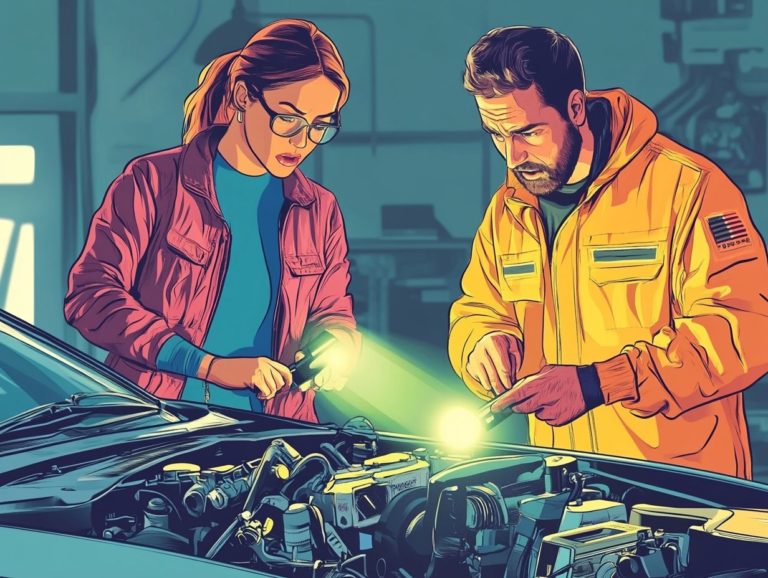How to Verify a Used Car’s Ownership
Buying a used car is exciting. But first, make sure you verify the vehicle’s ownership.
Without proper checks, you risk falling prey to scams or ending up with a car that has hidden issues.
This article explores the risks of buying a car with unclear ownership, outlines essential steps to confirm its legitimacy, and provides guidance on how to handle any red flags that may arise.
Arm yourself with the knowledge necessary to navigate this critical aspect of car buying with confidence.
Contents
- Key Takeaways:
- Why Verify a Used Car’s Ownership?
- Steps to Verify Ownership
- Additional Considerations
- What to Do If Ownership Cannot Be Verified
- Frequently Asked Questions
- 1. How do I verify a used car’s ownership?
- 2. Can I verify a used car’s ownership without the title?
- 3. What should I look for on a car’s title to verify ownership?
- 4. How can I verify a used car’s ownership if I am buying from a private seller?
- 5. Is it necessary to verify a used car’s ownership if I am buying from a dealership?
- 6. Can I use the vehicle identification number (VIN) to verify a used car’s ownership?
Key Takeaways:
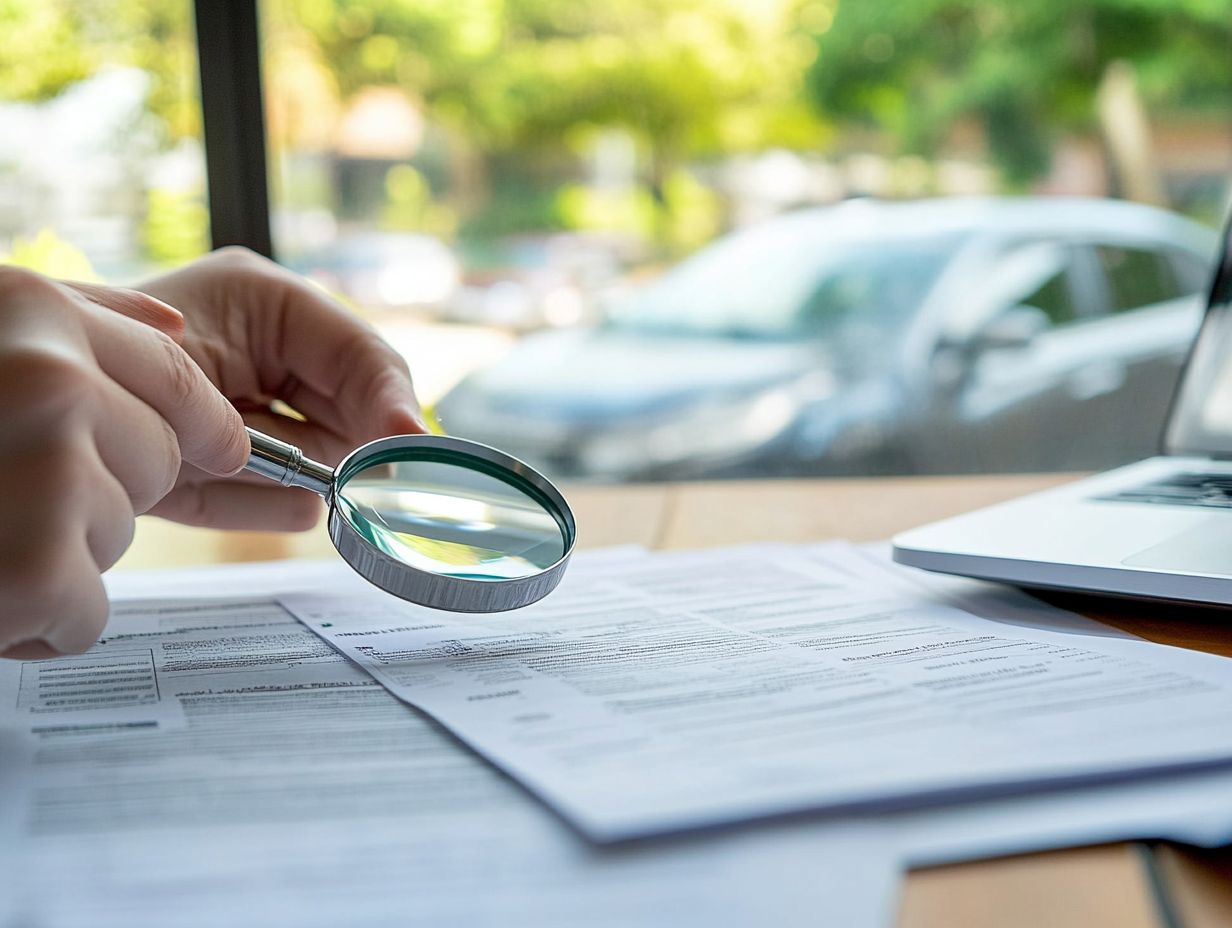
- Verify used car ownership to avoid potential risks of purchasing a car with false ownership.
- Obtain the VIN, check the title and registration, and run a vehicle history report to confirm ownership.
- Review additional documents and physically inspect the car before making a purchase.
Why Verify a Used Car’s Ownership?
Verifying a used car’s ownership is essential for you as a potential buyer. It helps you avoid pitfalls associated with fraudulent sales while ensuring the vehicle’s history matches the seller’s claims.
A thorough VIN (Vehicle Identification Number) check can reveal crucial details, such as accident history and prior ownership information. This safeguards you from unexpected liabilities.
This verification process uncovers previous accidents or salvage titles. It also confirms that the car hasn’t been reported as stolen through databases maintained by organizations like NICB. Such diligence enables you to make well-informed decisions, whether you’re purchasing from private sellers or dealers.
Potential Risks of Buying a Car with False Ownership
Purchasing a used car with questionable ownership can expose you to significant financial and legal risks. This includes the grim possibility of auto theft and financial liabilities tied to a vehicle’s accident history.
Buying a car with a salvage title can introduce unexpected challenges. Such vehicles are often classified as unsafe or unsuitable for everyday use, adversely affecting their resale value and complicating insurance claims.
Insurance companies often provide limited coverage for these cars, leaving you vulnerable. There s also the potential legal nightmare of unknowingly acquiring a stolen vehicle, which could result in losing the car and facing criminal charges, even if you acted in good faith.
You must verify everything before buying your dream car! Don t let hidden issues ruin your investment.
Steps to Verify Ownership
Verifying ownership of a used car entails a meticulous process that can greatly reduce the risks tied to vehicle purchases. Your journey begins with obtaining the vehicle identification number (VIN) the essential key for navigating various databases, including those held by the Department of Motor Vehicles and other public records.
Conducting a comprehensive VIN check unveils the vehicle s ownership history, reveals accident reports, and discloses any mechanical inspections it has undergone. By following this systematic approach, you position yourself to make a well-informed investment.
Obtaining the Vehicle Identification Number (VIN)
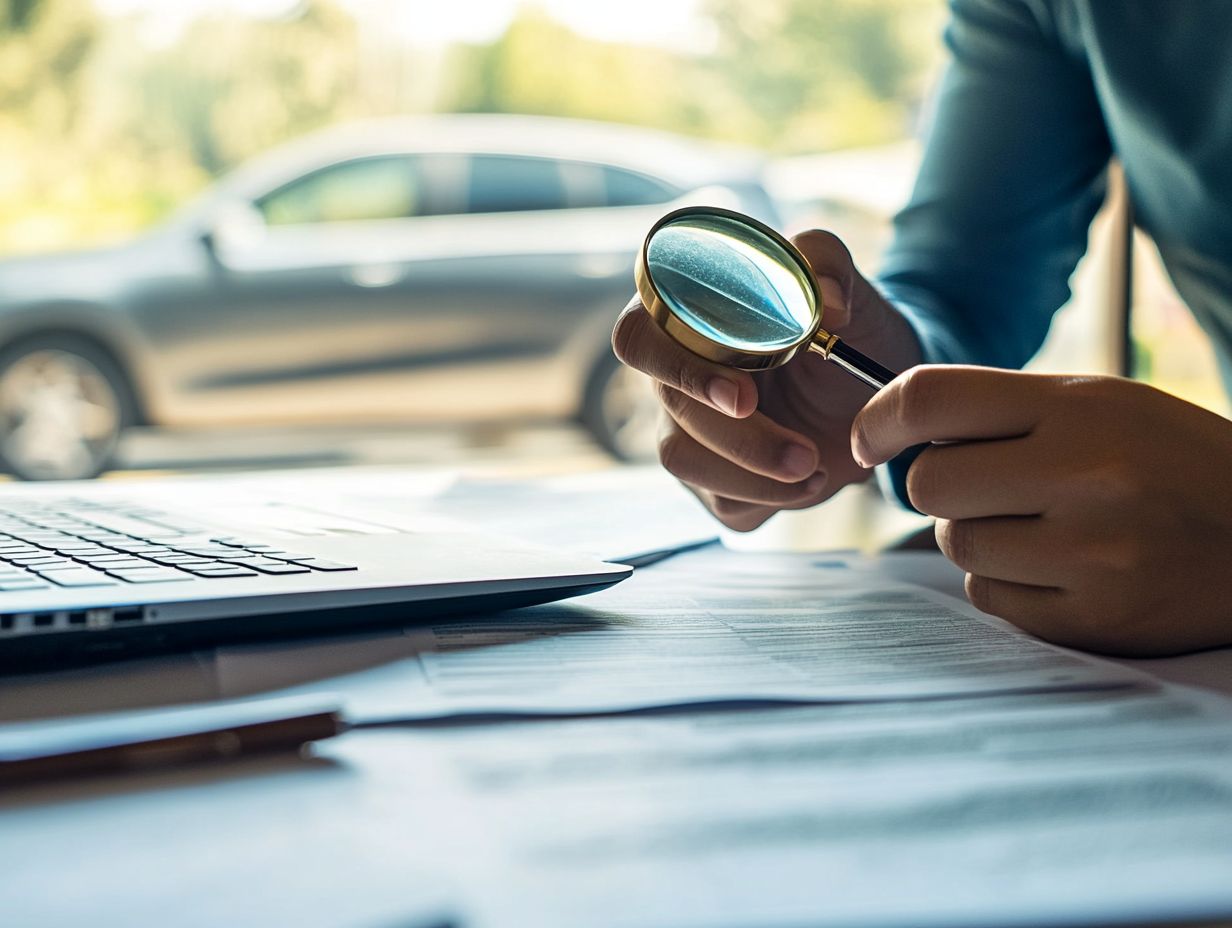
The vehicle identification number (VIN) is a 17-character code that uniquely identifies your specific used car. Obtaining it is the essential first step in verifying ownership.
You can typically find this number in several key locations on your vehicle. Look for it on the dashboard, visible through the windshield on the driver s side, and often on the driver’s side door frame. Some manufacturers even place the VIN on the engine block itself or within the vehicle’s registration documents.
Understanding the significance of the VIN is crucial for accessing a car’s history report. This reveals important details like title status, accident history, and any reported damages.
By cross-referencing this information with vehicle inspection services, you can effectively uncover any discrepancies that may signal hidden issues, enabling you to make a more informed purchasing decision.
Checking the Title and Registration
Checking who owns the car and its registration is essential to ensure it s free from liens or other encumbrances.
This step is vital for buyers. Accessing this information through the Department of Motor Vehicles (DMV) is straightforward; you can usually do it online or by visiting a local office.
Stay alert for potential red flags, like a title with multiple name changes or discrepancies between the title and the seller s identification. These inconsistencies might hint at deeper issues, such as undisclosed theft or outstanding financial obligations tied to the vehicle.
Running a Vehicle History Report
Running a vehicle history report using the Vehicle Identification Number (VIN) is a crucial step that reveals essential information about the used car, including its accident history and previous ownership details.
Obtaining a vehicle history report from reputable services like Carfax or AutoCheck is easy and can be done online with just a few clicks. By entering the VIN, you gain access to critical information necessary for your purchasing decision.
These reports typically provide insights into previous accidents, service history, title status, and even odometer readings.
Reviewing this data is vital, as it can uncover hidden issues that might escape notice during a simple inspection. By understanding the vehicle s background, you can make informed decisions, ensuring you invest in a reliable asset while avoiding costly surprises later!
Additional Considerations
Verifying ownership through the VIN and reviewing vehicle history reports are crucial, but there are more important considerations when purchasing a used car.
Get a mechanic to inspect the car. This ensures it meets the safety and reliability standards established by auto manufacturers.
Reviewing the insurance documents can also provide valuable insights into the vehicle’s past claims and any potential recalls associated with the model.
By thoughtfully considering these factors, you can further protect your investment and ensure a smarter purchasing decision.
Other Documents to Review
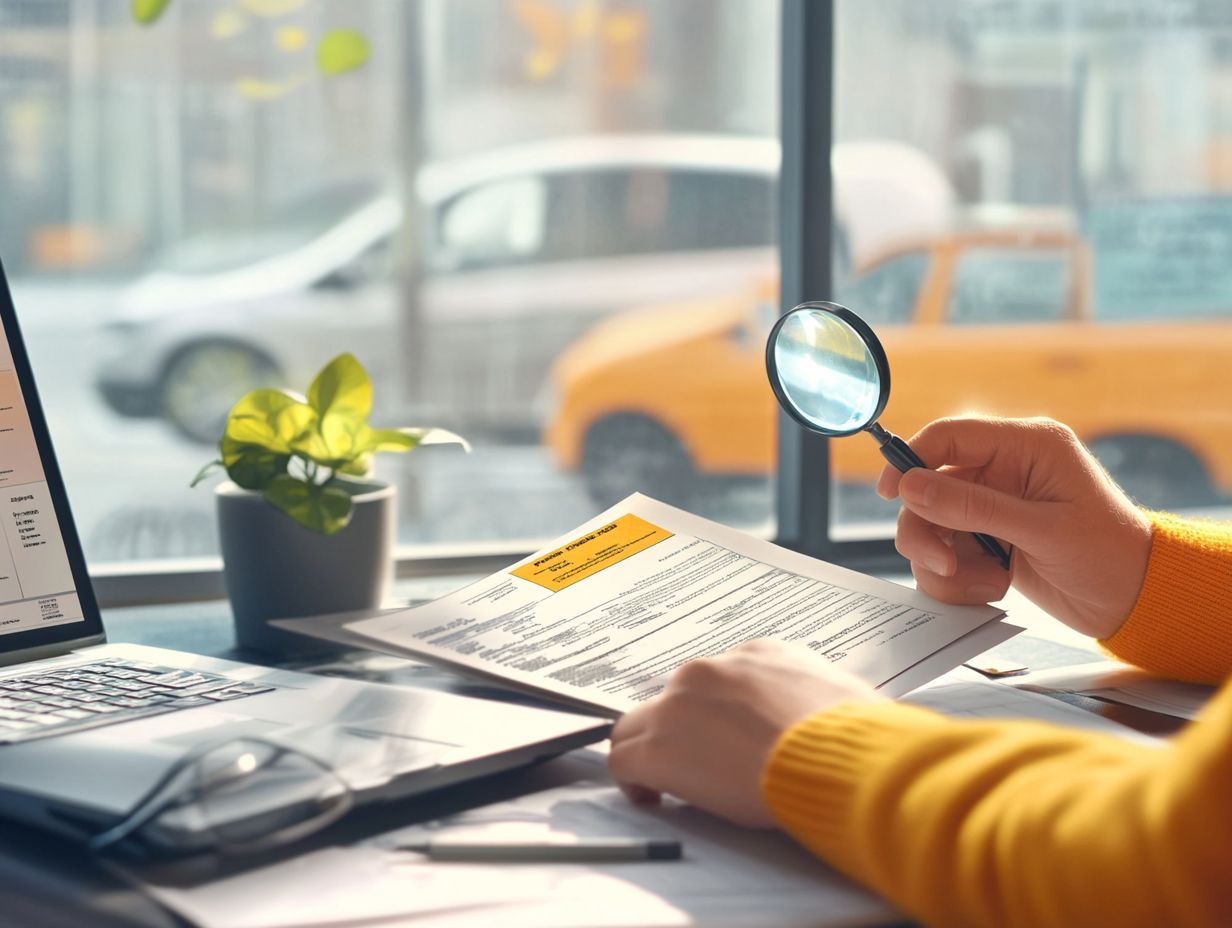
Reviewing essential documents is crucial for understanding the complete ownership history of a used car.
- Insurance papers
- Maintenance records
These records reveal not only how often the vehicle has been maintained but also highlight any significant repairs or accidents that may have occurred.
Service records can show whether the car has received regular care, offering insight into its overall condition over the years.
Proof of insurance is equally important, helping you determine if the car has been adequately covered throughout its life, which is vital for assessing its insurability and potential liability concerns.
Together, these documents act as invaluable resources, ensuring that the vehicle you re considering is in good working order.
Physical Inspection of the Car
Conducting a physical inspection of the used car is a critical step that enables you to evaluate its condition beyond what’s presented in the vehicle history report.
This careful examination includes looking for signs of previous accidents, like uneven paint or misaligned body panels, which could hint at hidden damage. However, a visual assessment alone may not reveal all potential issues that could impact the car’s long-term performance and safety.
This is where the expertise of a professional mechanic becomes invaluable. By performing a thorough inspection, the mechanic can uncover concealed problems, such as engine wear or transmission issues, that aren t immediately visible to the untrained eye.
This ensures that you make informed decisions and avoid unexpected costs later.
What to Do If Ownership Cannot Be Verified
If you discover that the ownership of a used car cannot be verified, it s essential to understand the legal options available to you. Knowing the next steps will help you protect yourself against potential fraud.
Legal Options and Next Steps
If you can t verify the ownership of a used car, act quickly to explore your legal options. This will help you address potential fraud and protect your investment.
Reporting the situation to law enforcement is a wise first step. It places the issue on record and may help uncover broader fraudulent activities.
Get legal help to understand your rights and options. It’s important to keep detailed records of all communications with the seller, including negotiations and attempts to verify the vehicle s ownership history.
This documentation can be crucial if the situation escalates into a legal dispute. It helps establish your case and may allow you to recover any financial losses incurred.
Frequently Asked Questions
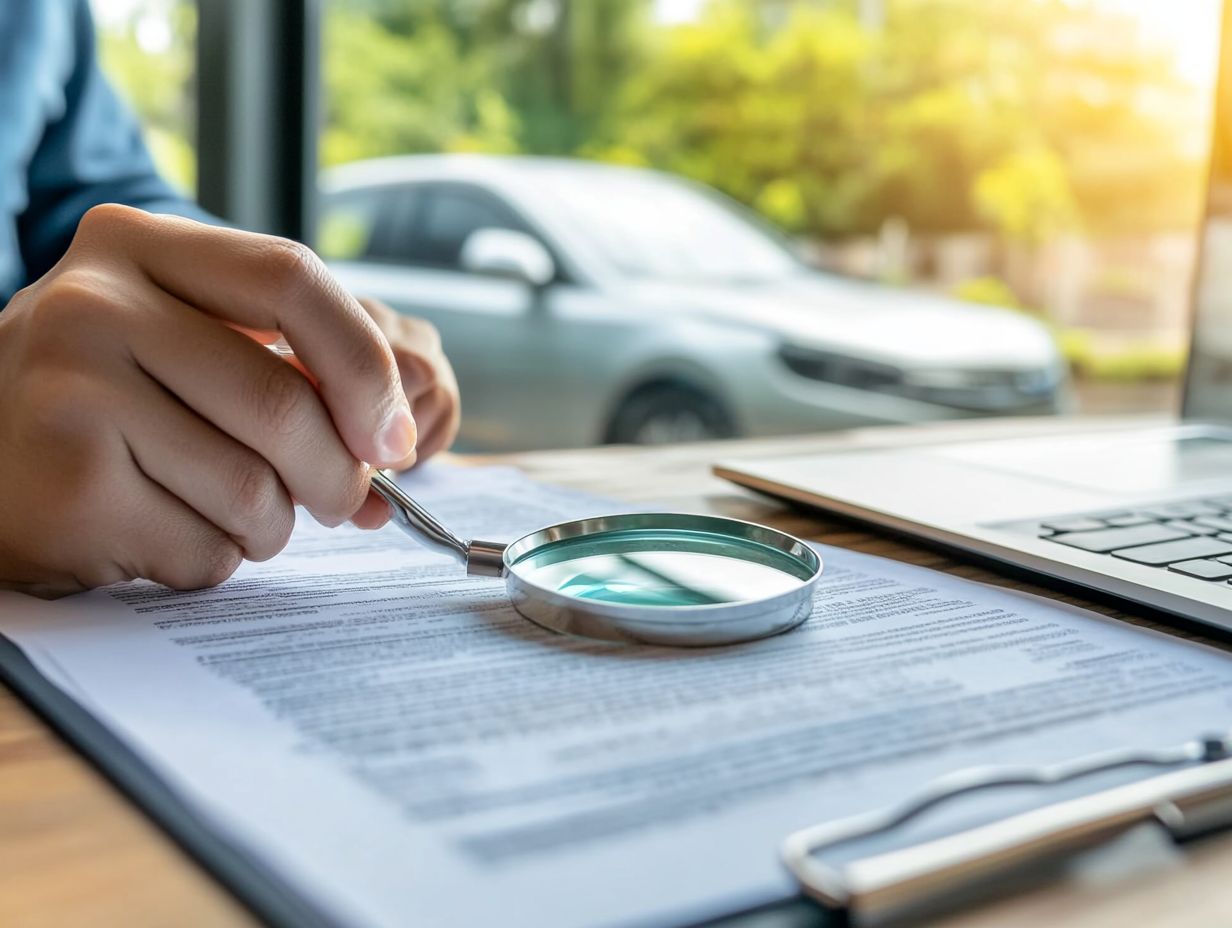
1. How do I verify a used car’s ownership?
To verify a used car’s ownership, obtain the car’s title from the current owner. This document contains the owner’s name and other important details that can be confirmed with the state’s motor vehicle department.
You can also request a vehicle history report, which is a document that shows previous ownership and potential issues with the car, from a reputable company.
2. Can I verify a used car’s ownership without the title?
No, the title is essential as it proves ownership. Without it, verifying the current owner and previous owners can be difficult.
Always obtain the title before purchasing a used car to ensure the ownership is legitimate.
3. What should I look for on a car’s title to verify ownership?
Ensure the title is in the current owner’s name. Check that it hasn t been altered and that the vehicle identification number (VIN) matches the one on the car.
Verify there are no liens or other restrictions listed on the title.
4. How can I verify a used car’s ownership if I am buying from a private seller?
If buying from a private seller, ask to see their driver’s license. Compare the name and address on the title with the information on the license.
You can also request other documents, like previous registration or insurance records, to help verify ownership.
5. Is it necessary to verify a used car’s ownership if I am buying from a dealership?
While not necessary, it s still recommended to verify ownership when buying from a dealership. Request to see the title and compare the info with the dealership’s records.
You can also obtain a vehicle history report to confirm the car’s ownership history.
6. Can I use the vehicle identification number (VIN) to verify a used car’s ownership?
Yes, the VIN is a unique number for each vehicle and can verify ownership. Request a report from a reputable company specializing in vehicle history reports to confirm ownership history using the VIN.
Taking these steps will help ensure you make an informed purchase.



